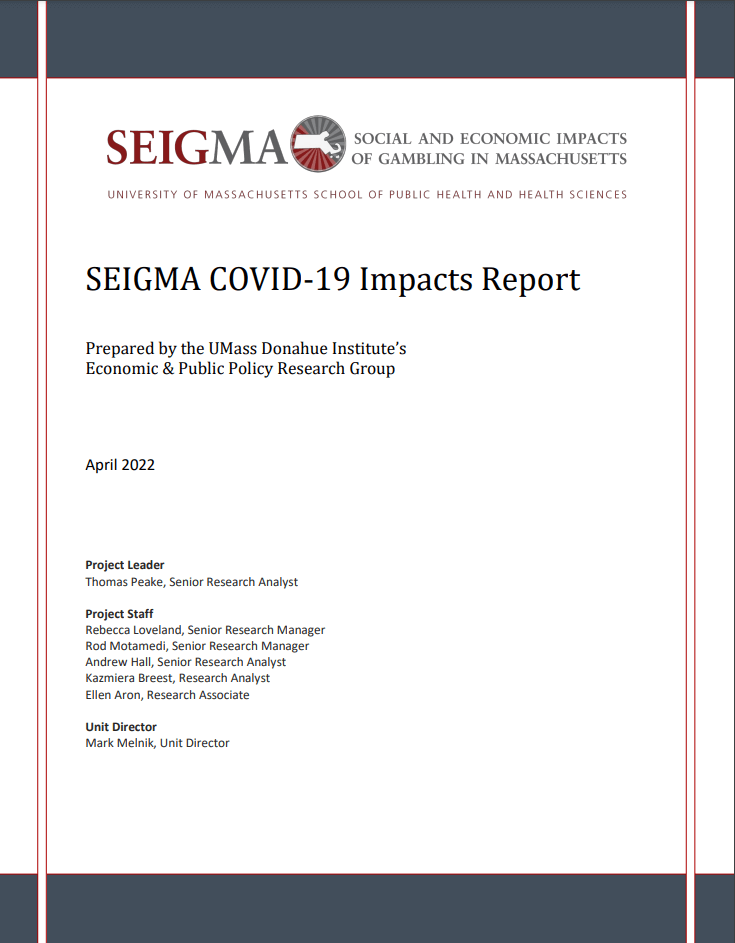SEIGMA COVID-19 Impacts Report
Executive Summary
The intention of the SEIGMA project is to track in as close to real time the social and economic impacts of the casino industry on Massachusetts. The industry was introduced with the expectation of creating significant revenue, employment, and business-to-business activity around the Commonwealth. As the industry matures in the state, it is also important to understand how those impacts can shift and change over time and what potential market shocks and threats mean to the industry and the economy as a whole. Perhaps nothing exemplifies those shocks and threats more than the COVID-19 crisis. As is welldocumented, social distancing efforts associated with the pandemic led to widespread shutdowns and staff reductions in the economy, particularly in the leisure and hospitality sector. As these effects were becoming clear in the summer 2020, the SEIGMA team felt it was an important opportunity to track the nature and extent of pandemic-related shocks to casinos, their workforce, and the related economic ecosystem. In this report, we analyzed data from all three casinos between January 2020 and June 20211 in order to assess the impacts of the COVID-19 crisis on the casino industry in Massachusetts to date. In keeping with the broader mission of the SEIGMA project and the other work of the UMass Donahue Institute, we approached this task with a particular eye towards equity issues.
Following a three-month period of total shutdown, the casinos reopened in July 2020. Since then, they have continued to operate amid a shifting landscape of regulations and limitations. Within that landscape, each casino adjusted their operations accordingly. As of June 2021, visitation levels at the casinos had not returned to pre-pandemic levels, although the patrons gambling at the casinos after reopening appear to spend more on average than pre-pandemic patrons, bolstering gross gaming revenues (GGR). Staffing levels have recovered somewhat following substantial layoffs in the spring of 2020. While casino employment appears lower than prior to the pandemic, many casino employees who were laid off or furloughed as the casinos closed have been hired back, with the majority of casino hires since April 2020 being “rehires.” While approximately three months of taxable revenue was lost because of the shutdown, the casinos continue to provide tax revenue and payments to their host and surrounding communities comparable to what they paid prior to the shutdown.
In addition to analyzing these high-level trends, we also examined the disparate impacts of the shutdown and recovery of the casinos. The COVID-19 recession proved to be the most unequal recession on record, 2 with young people, low-wage workers, women, and people of color bearing the brunt of job losses and reduction in hours. These impacts were no different within the casino industry in Massachusetts. In particular, workers in the food and beverage, gaming and recreation, and hotel departments, which are areas with high concentrations of workers of color, were heavily impacted by the casino layoffs. Since the initial shutdown, many of these workers have returned to the casinos, but the loss of jobs and wages certainly exposed these workers to broader elements of economic instability. Furthermore, the share of women in each casino’s workforce has been slow to recover as the facilities re-open and return to more typical operating levels.
1 The study period under analysis was January 2020 to June 2021 for the visitation, revenue, and employment data provided by the casinos. However for some of the revenue and workforce related data obtained from other sources, we examined a longer time series to provide additional context.
2 https://www.washingtonpost.com/graphics/2020/business/coronavirus-recession-equality/


